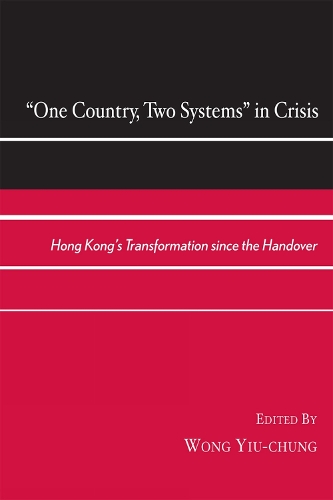
One Country, Two Systems in Crisis: Hong Kong's Transformation since the Handover
(Paperback)
Publishing Details
One Country, Two Systems in Crisis: Hong Kong's Transformation since the Handover
By (Author) Wong Yiu-chung
Contributions by Brian Bridges
Contributions by Albert H.Y. Chen
Contributions by Anne S. Y. Cheung
Contributions by Fung Ho-lup
Contributions by Kenneth Ka-loh Chan
Contributions by Beatrice K.F. Leung
Contributions by Anita Y. K. Poon
Contributions by Ting Wai
Contributions by Timothy Ka-ying Wong
Bloomsbury Publishing PLC
Lexington Books
19th June 2008
United States
Classifications
Professional and Scholarly
Non Fiction
Public international law: treaties and other sources
Human rights, civil rights
951.2506
Physical Properties
Paperback
254
Width 153mm, Height 230mm, Spine 19mm
381g
Description
In the tumultuous negotiations of the Sino-British Joint Declaration of 1984, the United Kingdom willingly signed over Hong Kong's reigns to the People's Republic of China, but with the presupposition that the PRC would faithfully implement the principle of "one country, two systems" for the following fifty years. Yet since the handover in 1997, the PRC has failed to allow Hong Kong a higher degree of autonomy. "One Country, Two Systems" in Crisis elucidates how China's intervention has curtailed Hong Kong's civil liberties; how freedom of speech is at the mercy of the government; and how deception has turned the "Pearl of the Orient" into the rubber stamp of the Chinese Communist Party.
Reviews
This edited volume covers a good range of topics related to post-1997 developments in Hong Kong. These include the major events and political and legal changes that shed light on the practice of 'one country, two systems' (state-society relations in the realms of education and, immigration policy, state-church relations), and Hong Kong's relationship with international actors such as the European Union, the United States, and Taiwan. All the chapters are written by scholars based in Hong Kong, and the book reflects developments accurately, in a way that can easily be understood by people outside Hong Kong. In devoting about a third of its contents to Hong Kong's changing relationship with the outside world, the book compares favorably with other edited volumes on post-1997 developments. -- Ma Kgok, Hon Kong University of Science and Technology * The China Journal *
This is a timely book. Anyone interested in knowing what has happened to Hong Kong after the handover will find it informative and interesting. -- Alvin So, Hong Kong University
Author Bio
Wong Yiu-chung is associate professor of politics and sociology at Lingnan University, Hong Kong.
